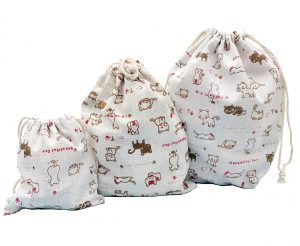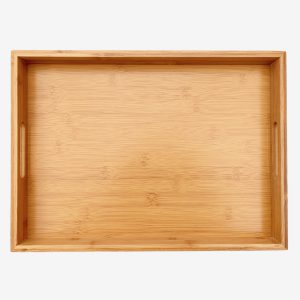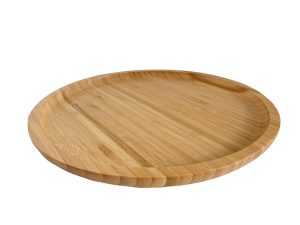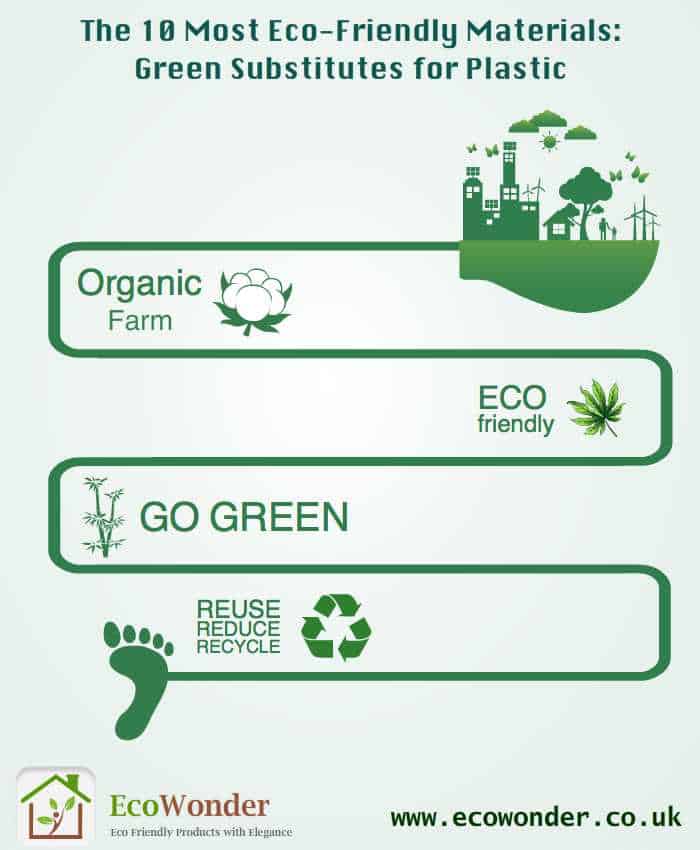Today, plastics objects are all around us, from the food containers, and the clothes fashioned from plastic fibres to important building material used in everything such as insulated wall panels and window frames. Our dependence upon plastic also has an increasingly serious downside, because the tremendous plastic pollution is ravaging wildlife and washing up on beaches. The green movement is making huge strides replacing plastic with organic fibres like bamboo and hemp, as well as good old corn starch and used paper. Here is a go-to list of the more Eco-Friendly Materials, alternatives to plastics that are currently available in the market.
-
Recycled Glass
Unlike plastic, which often is derived from fossil fuels, glass is made from sand. This renewable resource doesn’t contain any chemicals that can leach into your food or body. And it’s easily recycled — glass produced from recycled glass is melted at lower temperatures thus lowering energy requirements for production compared to glass produced directly from raw materials. Container manufacturers and the fiberglass industry together reuse 3.35 million tons of recycled glass annually.
-
Bamboo Fibre
Bamboo is considered one of the most renewable resources on the planet and one of the most Eco-Friendly Materials, since it is naturally pest-resistant, grows incredibly fast and can actually help rebuild eroded soil. It also regenerates without need for replanting and requires minimal fertilisation or pesticides. Natural bamboo fibres are created from the pulp of bamboo grass. There are actually two methods (mechanical and chemical) of extracting fabric from the bamboo plant. These methods do have some environmental drawbacks but could potentially be sustainable.
-
Starch-based Biocompatible (Bioplastics)
As a totally biodegradable, low-cost, renewable and natural polymer, starch has been receiving lots of attention for developing as a sustainable alternative to petroleum-based plastic which take thousands of years to biodegrade in the environment. Corn and potato starch can be used to produce tableware, straws, cups, and packaging are commonly made from plastics. A combination of revitalizing old ideas and revolutionizing plastic technology to make biocompatible products looking and feeling just like regular plastic may be the right step forward.
-
Recycled Paper
Million trees, many may come from endangered forests, are killed each year to produce ‘virgin paper’ (paper that comes directly from trees). Recycling paper is one of the easiest ways to have a positive impact on the environment. For every ton of paper that is recycled, 17 trees are spared. This is enough to significantly impact the amount of greenhouse gases in the atmosphere and keep paper out of our landfills. You can recycle most paper, including white office paper, newspaper and mixed-colour paper, through a local recycling program. You can also reduce your use and reuse your paper when possible.
-
Organic Cotton
Conventional cotton production using toxic pesticides and fertilisers and around 11,000 litres of water for every kilogram of cotton can have a huge impact on the environment. If you want to make a positive change, and support a better future, then start with small changes in making your lifestyle a little bit healthier by switching to organic cotton. Organic cotton is grown without harmful toxic pesticides and synthetic fertilisers and requires less water meaning lower impact on the surrounding areas. Although organic cotton products can cost more than conventional cotton due to farming and manufacturing processes, as consumers we may be worthy to pay the extra price to help promote a sustainable and eco-friendly industry.
-
Stainless Steel
Tough and easy to clean, stainless steel is a long-lasting, durable and 100% recyclable material. Stainless steel does not contain any potentially harmful chemicals and can replace many commonly used plastic materials and appliances in the kitchen such as single-use cups, storage containers, bins, and lunch boxes. In addition to its shine and beauty, food grade stainless steel serves as an eco-friendly alternative to plastic for your kitchenware.
-
Hemp
As a member of the Cannabis Sativa plant family, hemp dates back to more than 10,000 years ago with a myriad of uses such as paper making, cloth weaving and extracted oils for medicinal products and skincare. Hemp is an eco-friendly material because it usually doesn’t need as much water as regular cotton, and it needs few pesticides compared to other fibres. As a fabric, hemp is stronger and more lasting than cotton; it softens with use and yet, remains hard-wearing. Hemp also allows your skin to breathe better and regulates your body temperature, keeping you cool in summer and warm in winter.
-
Stone wool
Stone wool, also known as mineral wool, comes from natural basalt rock and recycled slag (a mineral by-product of smelted ore). Over the past few years, stone wool has gained popularity as a valuable and sustainable building material due to its unique properties, including fire and water resilience. Unlike foamed plastic or fibreglass, stone wool can be engineered to provide higher thermal insulation and sound absorption. Made from one of the Earth’s most abundant minerals, stone wool can be a promising alternative for plastic in the building industry.
-
Aluminium
Do you know that aluminium is one of the most environmentally friendly metals on the planet? Often used as a beverage container, aluminium is the most recycled industrial metal in the world. Aluminium is an extraordinarily versatile, so it has been designed for use in all areas of our everyday lives. When compared to the reusable plastic products, an aluminium container will be more durable and last much longer. Aluminium is lightweight, recyclable and can be stacked to ship efficiently thus lowering carbon emissions through logistics and supply chains.
-
Biodegradable Plastics
Unlike bioplastics made from natural materials, biodegradable plastics is made from traditional petrochemicals, which are engineered to break down more quickly. Although closely resemble man-made polypropylene, biodegradable plastics aren’t as versatile as petroleum-based plastics and hasn’t been used in significant quantities because of higher manufacturing costs. A variety of products, including disposable package for foods, beverages and various medical applications can be made by biodegradable plastics. However, you might not be aware that biodegradable plastics do not decompose unless they are disposed of properly, they usually can’t be effectively composted and don’t usually break down in landfills.






